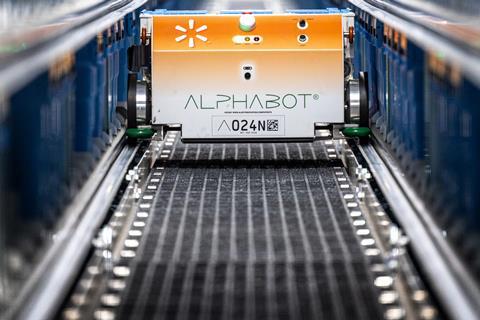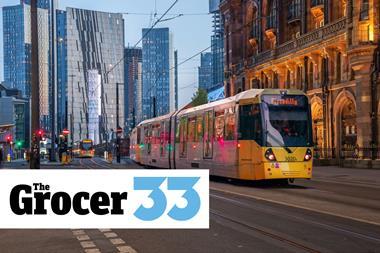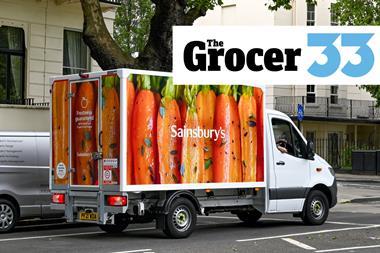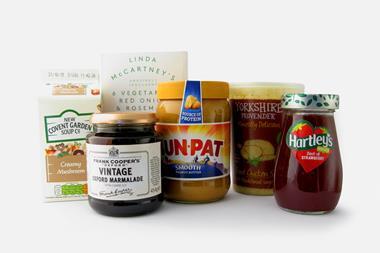MFC technology rollout has slowed. Will Walmart’s Alert Innovation acquisition break the inertia?
Walmart is making a mammoth bet on micro-fulfilment. This month it agreed to acquire Alert Innovation, a robotics company whose machines store, retrieve and dispense grocery orders – but crucially take up minimal floor space.
Having worked with Alert since 2016, and in 2019 piloted its first micro-fulfilment centre in a New Hampshire store, the retailer is bullish on the technology’s potential.
“Further investing in this technology will enable us to leverage our store footprint – 4,700 stores located within 10 miles of 90% of the US population – for storage and fulfilment,” Walmart says. The roll-out is expected to be swift; the acquisition means “deploying MFCs with greater speed”.
So what does Walmart’s big bet on MFCs mean for the burgeoning tech? And will UK mults follow the world’s biggest retailer in installing their own?
MFCs allow retailers to use excess space in stores for highly automated, speedy online and click & collect order fulfilment. They serve a similar function as Ocado’s robotic grid systems, but on a much smaller scale. Yet despite the touted benefits of and initial excitement around the tech, adoption has been sluggish.
As of the end of 2021, there were only 61 projects live globally, according to Interact Analysis research. And adoption was slowing in line with online grocery shopping, while inflationary pressures were turning retailers off high capex punts. It led “many to believe this is a technology push, rather than a market pull, solution”, says Interact research analyst Rowan Scott.
“Over the past 18 months, we’ve seen a slowdown in the market due to a chicken-and-egg scenario where grocers are waiting on other grocers to roll out automated MFCs at scale,” he adds. Walmart’s move “will be the catalyst that breaks the inertia”, Scott says, predicting there will be more than 7,000 MFCs globally, including hundreds in the UK, by 2030.

Big player advantage
If those forecasts are sound, Walmart’s acquisition gives it a significant advantage.
“Buying a vendor gives you a huge cost advantage if you can scale,” says Tom Andersson, principal analyst at Stiq, “and you’ll always be number one in the delivery queue”.
So will the likes of Tesco or Sainsbury’s follow suit?
In the UK, Tesco has been rolling out urban fulfilment centres since last summer, with initial plans for “at least” 25 across the UK placed in excess space in its larger stores. But the rollout has slowed and now numbers only four. Alert rival Takeoff was mentioned in a Capital Markets presentation, but was simply “illustrative” of “a company that is doing interesting things”, Tesco said. It is now working with Dematic.
“Tesco may have the financial firepower to acquire a vendor, but the requirement to scale is massive – unless you can sell the same solution to rival grocers – especially considering the current inflated prices,” Andersson says. “Tesco and many other grocers are only at the beginning of their MFC journey and unlikely to yet make MFCs work in terms of a reasonable ROI.” Andersson says.
There are important differences between the US and UK markets. In the US MFCs can be seen “as a shortcut to improved efficiencies” versus the “greater scepticism” here.
Furthermore, he adds, “in the US there is also a much higher rate of collection whereas UK online consumers are biased towards home delivery, potentially better served by centralised fulfilment”.
There are also several factors helping make the case for MFCs, though. A study by Accenture and Frontier Economics concluded London delivery traffic would fall by 13% if MFCs fulfilled half of the capital’s e-commerce orders over the next five years.
“The threat of recession and inflationary pressures are also adding to the mix,” Andersson says. “MFCs may actually become a more suitable solution as the cost of petrol increases for centralised fulfilment operators.”
But while Walmart may have ramped up the hype around MFCs again, their rise could take a while. Retailer acquisitions will likely remain rare.
“It is important to look at this and understand it takes time to realise a vision,” says e-commerce insights expert Celia Van Wickel. “Amazon has been tweaking one-day delivery for years, for example. Walmart is looking ahead while many others are still in pilot mode.”
Undoubtedly, Walmart’s bet will “lead to accelerated urgency in the many ongoing trials with MFCs”, says Andersson. “The question is whether it will lead to explosive growth in the market, since the key fundamentals remain.”




















No comments yet